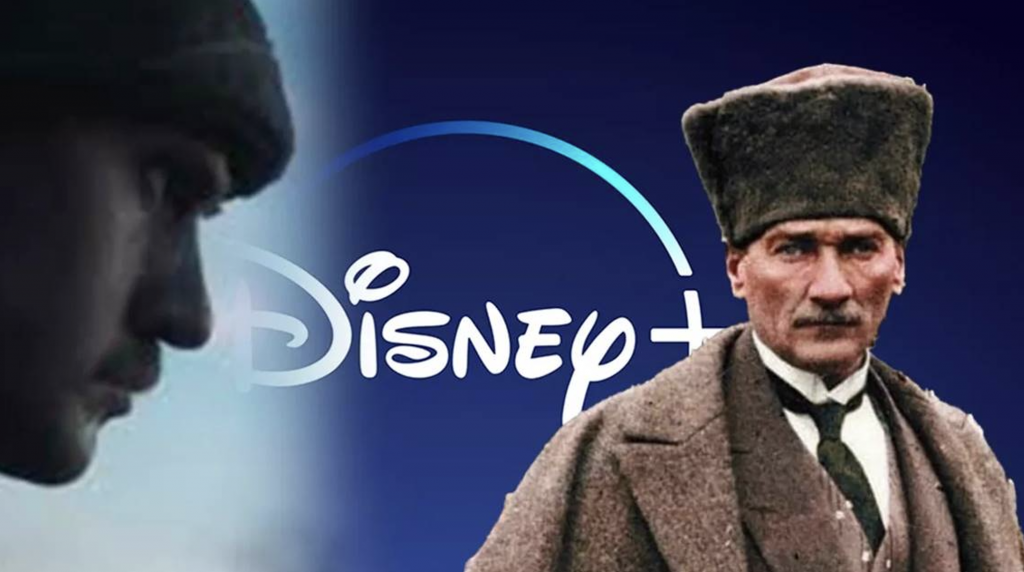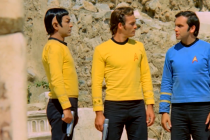Disney+ has lost tens of thousands of subscribers after cancelling its plans to air a television drama series about Atatürk. Turks worldwide have reacted furiously to the cancellation news, ostensibly due to American anti-Turkish lobbying, but was the reaction justified?
Last year, Turks were thrilled to learn that Disney+ (Disney Plus) was planning to produce a six-part docu-drama on Mustafa Kemal Atatürk, the military leader who led Turks to victory during its War of Independence before establishing the modern Turkish Republic.
The news about the Atatürk project broke ahead of the channel’s launch in Türkiye and excitement grew further when it was rumoured that world famous British actress Emma Watson would be part of the cast.
The period drama was scheduled for release on Disney+ on the hundredth anniversary of the Turkish Republic on 29 October 2023. When the first trailer for Atatürk dropped on 28 October 2022, it aroused great interest, so much so that it received a record breaking 15 million views on social media within four days of its release.
At the start of July 2023, Disney+ Türkiye starting to hype up its upcoming Atatürk series, posting on X, formerly known as Twitter, that “The original series #Atatürk will be on air very soon, on the 100th anniversary of our Republic.”
In addition to Türkiye, the global Turkish diaspora were also keen to see this historical drama, with most interest registered in the Turkish Republic of North Cyprus, Azerbaijan, Western Thrace and the Balkans.
The focus of the Disney+ series was said to be Atatürk’s pre-Republic life, capturing the period from his childhood to the decision to go to Samsun in 1919, that marked the start of the War of Independence.
Respected and popular Turkish actor Aras Bulut Iynemli was cast in the title role and details had already emerged that the production team had been filming the drama for four weeks in Macedonia during October and November 2022.
Locations where the film was shot included near Bitola, Resen, and Skopje. Mustafa Kemal had attended military high school in Monastir (today’s Bitola) from 1896 to 1898, giving the area local relevance to the Turkish leader’s life.
View this post on Instagram
The Armenian lobby and Disney+ cancellation news
On 28 July 2023, a newspaper in Türkiye reported that Disney+ had decided not to broadcast its Atatürk television series globally, and that the video streaming channel was instead going to use the footage to produce two films, one to be shown on the free-to-air Disney-owned Fox Türkiye television channel and the other to be screened in cinemas across Türkiye.
Other media quickly picked up on the story, some attributing it to cost-cutting at Disney+ worldwide. However, others pointed to efforts by the American Armenia lobby to have the project cancelled as the reason for the change in Disney’s plans.
On 3 July, an online petition on campaign site change.org demanding Disney aborts its Atatürk series had collected just 347 signatures – hardly impactful – yet, bizarrely, the Armenian National Committee of America (ANCA), an anti-Turkish racist lobby organisation, took responsibility for Disney+’s cancellation of the TV drama.
Disney gave no indication that these claims were true, but Turks nevertheless went on the offensive, incensed that having advertised its series, the channel was now backtracking, apparently to appease – or sidestep – the wrath of the Armenian diaspora.
For Turks, it was unthinkable that the world wouldn’t want to know about the greatest nation-builder of modern times and one of the most important political leaders of the 20th century. Whatever criticisms could be levelled at Mustafa Kemal, his incredible legacy certainly merited screentime.
Unfortunately, the Armenian diaspora, often backed by the Greek and Kurdish diasporas, have regularly launched projects to smear Turks. One of the most recent victims was Dr Mehmet Oz, who endured a vicious and racist campaign when he stood as a candidate in Pennsylvania for the U.S. Senate.
These incidents, and others aimed at vilifying the Turkish government, creates a toxic environment between Turks and Armenians at a crucial time when Yerevan and Ankara are seeking to normalize relations between Türkiye and Armenia and also between Armenia and Azerbaijan.
Disney’s docudrama on the anniversary of such a pivotal date in history will no doubt raise awareness of the events in Anatolia during the First World War, where hundreds of thousands of people were killed and displaced.
Turkish historians have regularly called for all sides to open up their archives so the truth of this tragic period can become better known. Sadly, certain communities are more interested in promoting cancel culture and do not seem much interested in the facts, preferring instead to shut the door on the discussion of this crucial – and often contested – period of shared history at the end of the Ottoman Empire that impacted Armenians, Greeks and Turks so heavily.
Fury of the Turks
For many Turks and the Turkish global diaspora, who were eagerly awaiting the Mustafa Kemal TV series, the cancellation bore all the hallmarks of ANKA and its activists trying to steal the show and re-write the script.
Armenians and Turks quickly went into overdrive on social media, each with their own narrative of why Disney had changed its Atatürk series plans. As the furore continued to grow, with claims and counter claims of what had occurred, the channel refused to get drawn in.
The issue turned political in Turkiye, with senior government figures criticising Disney’s decision to drop its TV series, while broadcasting watchdog RTUK announced an investigation into the affair and said the head of Disney Türkiye would have to appear before the Turkish Parliament’s Digital Channels Commission to explain their actions.
Prominent Turkish personalities and social media influencers joined the general Turkish public and diaspora in condemning Disney over its ‘unacceptable’ decision. Intellectuals from the Turkish world of culture, art and science came together to react to Disney’s Atatürk decision and released a statement with a headline “This script doesn’t work!”
An open letter from 218 retired Turkish diplomats called on Disney+ to reinstate the Atatürk series as first announced, while highlighting that ANCA supports ASALA, a terrorist organisation responsible for the assassination of Turkish diplomats around the world during the 1970s and 80s.
Cumhuriyetimizin kurucusu, ebedi liderimiz #Atatürk ile ilgili diziyi, Amerika Ermeni Ulusal Komitesi’nin (ANCA) baskısı üzerine gösterimden kaldırma kararı alan #Disney+ dijital yayın kanalına, bugün (10 Ağustos 2023), 218 Emekli Türk Diplomatın imzasıyla gönderilen metin ve…
— Namık Tan (@NamikTan) August 10, 2023
A campaign encouraging Turks to cancel their subscription to the channel, now dubbed ‘Disney Minus’, went viral.
We strongly condemn Disney’s decision to prevent the Atatürk series from airing as a result of pressure from hateful and racist Armenian diaspora lobby organisations. #BoykotDisneyPlus #Disneyiptalet#BoycottDisneyPlus pic.twitter.com/g9I1UvIArK
— Y.T.C (@Young_Turk_Cyp) August 2, 2023
A statement by Cenk Soner, the head of Walt Disney Company Türkiye, on 2 August aimed at placating the feelings of Turks by confirming the new plans, failed to make any headway:
“As a result of the changes made in our content strategy, a special TV version of ‘Atatürk’ will be broadcasted on our FOX channel [in Turkiye]; two films will be in the movie theatres [in Turkey] and then on FOX TV screens.”
Saner Ayar, the founder of Lanistar Medya, which has produced the Atatürk docudrama for Disney, also tried to put a positive spin on developments: “As part of the centenary celebrations [of the Turkish Republic], we’re proud to announce that we will be bringing Atatürk to a much wider audience by broadcasting [the drama] on free-to-air Fox.”
Yet the damage was done and three weeks on, Turks in Turkiye and abroad are still cancelling their subscriptions to Disney+ in their droves.
Have the Turks over-reacted?
But have the Turks over-reacted? Disney has never suggested the Armenian lobbying affected their decision to change their production plans for Atatürk. They have consistently stated the decision was due to “revised content distribution strategy to reach wider audiences.”
The demands by Turks for the channel to stick to its original announcement and air the drama series on its subscription channel worldwide may be short-sighted too, given Disney is infinitely less popular than other streaming channels such as Netflix and Amazon Prime.
According to Flix Patrol, which monitors audience levels on leading streaming platforms, Disney+ had acquired an estimated 50,000 subscribers since its launch on 14th June 2022. In contrast, Netflix has over 2.6 million subscribers, and Amazon Prime has 400,000. Airing the Atatürk docudrama on one of Disney’s free-to-air channels – one which is also broadcast internationally to the Turkish diaspora via satellite – was clearly going to reach many more Turks.
Global data on viewing figures and subscriptions also highlight how Disney+ was struggling and needed to scale back, given the significant drop in subscribers and international viewers for the streaming platform. The US entertainment giant had 146.1 million international customers in its third quarter that ended on 1 July, down by 7.4% from the 157.8 million audience it had reported in the second quarter. Disney+ had also lost some 4 million subscribers in the second quarter.
Although Disney+’s parent company had looked to expand international content by enhancing local and regional content for its streaming services, plans seem to have changed when retired former CEO Bob Iger, 71, returned to Disney at the end of 2022 to take over from his successor Bob Chapek, who had frustrated shareholders.
Iger promptly announced plans to embark on sweeping spending cuts, including plans to lay off 7,000 workers, and to increase profitability. The production of original local content was also to be removed from global viewing because of the financial challenges the company faced.
Whatever the real reasons behind its change of plan for its Atatürk production, media experts believe that Disney has shot itself in the foot by appearing to ‘cancel’ the TV series. The drama initially seemed a great marketing strategy to quickly establish the channel in a new market where its competitors had a strong hold. The decision at global headquarters to scale back on local content without properly engaging the local audience has seriously damaged Disney in Turkiye, not just as a brand but as a business.
Disney is also celebrating its centennial this year, but few will care in 85 million Turkiye and its wider diaspora of 15+ million Turks, given the decision to downgrade broadcast plans for the country’s founding father. And Disney’s loss will very much be their rivals’ gain.
Could the brand recover? Possibly, but the road ahead looks tough given the battering it has received. Much depends on whether the two Atatürk films Disney produces and airs this autumn are well received.
The ‘Disney Minus’ affair will make for a good marketing case study and a strong lesson for all brands not to remain aloof to issues that arise in its smaller markets.
Disney+ Turkiye were contacted to comment on this story, but no response was received at the time of publication.





